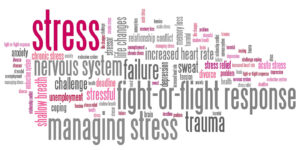You or others have noticed that in certain situations, you may have a unique reaction compared to others. For example, when you’re faced with a stressful situation, you may become more agitated or withdrawn. Or, when someone is being emotional around you, you may feel overwhelmed and not know how to respond. Maybe, you’ve normalized these reactions, thinking that it’s just your personality or a “quirk” you have. But what if I told you that these responses could be related to trauma? Trauma can manifest in many ways and affect individuals differently. It can stem from a variety of experiences such as abuse, neglect, natural disasters, accidents, or loss of a loved one. Our body’s and mind’s way of coping with trauma comes from these events. They are full of overwhelming emotions and memories. These are trauma responses. Let’s learn about them and how trauma therapy in Forth Worth, TX can help.
What are Trauma Responses? 
Trauma responses are involuntary reactions. They protect us from trauma’s overwhelming effects. These responses can be physical, emotional, cognitive, or behavioral in nature. Trauma responses often happen when your current environment or situation reminds you of a traumatic event from your past. It can be triggered by something as small as a sound or smell, or there may not have any identifiable trigger at all. For instance, you could be in a coffee shop and hear a car backfire, and suddenly your body tenses up, and you feel a surge of anxiety. These intense reactions can confuse you as you’ve seen no one else react the same way.
Additionally, every person is unique in how they respond to trauma. Another trauma survivor may have heard that same noise and not react at all, while some may have a similar reaction to yours. There is no “right” or “wrong” way to respond to trauma. Plus, it there is a lack of social support and understanding, these responses can make you feel isolated and alone.
Fight, Flight, Freeze, or Fawn
The most commonly known trauma responses are the “fight, flight, freeze, or fawn” reactions. These are primal instincts that our body and mind use to protect us from perceived danger. They can occur in any order and can even happen simultaneously. Fight refers to the instinctual response to fight off a threat or danger physically. Flight is the urge to escape and avoid the danger. Freeze is when your body immobilizes, unable to move or react. Lastly, fawn is a response where you try to please and appease others in hopes of avoiding harm.
For instance, if your danger response is fight, you may become aggressive or confrontational when triggered by trauma. On the other hand, if your danger response is flight, you may tend to avoid situations or people that remind you of the traumatic event. If your response is freeze, you may feel paralyzed and unable to act or speak. Lastly, those who have a fawn reaction may try to please others and avoid conflicts at all costs. You may already know your primary danger response, but you may also switch between different responses in various situations. But besides these four, there are other trauma responses that you may experience.
Trauma Therapy Can Help with Hypervigilance
Have you found yourself feeling on edge and constantly scanning your environment for potential danger? This could be a sign of hypervigilance. It is an intense state of being overly aware and alert to potential threats or harm. For instance, if your parent was physically abusive, you may have learned to be hypervigilant as a child to avoid getting hurt. This response can also manifest as difficulty sleeping or concentrating due to being in a constant state of alertness.
Hypervigilance can help you feel more in control and prepared for danger, but it can also be exhausting and make it difficult to relax. This can lead to anxiety, panic attacks, and even physical symptoms like elevated heart rate and muscle tension. It’s a symptom of trauma and, if left unresolved, can have a significant impact on your daily life.
Avoidance is a Trauma Response
Just like the “flight” trauma response, avoidance is when you try to escape or avoid situations, people, or memories that may trigger trauma. It’s a common response to trauma and can be a way for your mind to protect you from the pain of reliving traumatic events. Your mind and body may think you’re not ready to face these memories, and avoidance is its way of coping. However, avoiding triggers can also hinder your ability to heal and move forward.
For instance, if too many people in a room overwhelm you due to past traumatic experiences, you may avoid social gatherings altogether. But this can lead to isolation and missed opportunities for healing and growth. Avoidance can also include avoiding thoughts or emotions associated with trauma, leading to a lack of understanding and processing of these difficult memories. Temporarily, avoidance may feel like a coping mechanism, but long-term it can prevent you from fully healing.
Learn How to Not Disassociate in Trauma Therapy

Dissociation can be challenging to recognize as it often happens automatically and outside of your control. It can also manifest as memory loss or feeling like you’re watching yourself from the outside. Dissociation is a common trauma response, and by working with a Fort Worth trauma therapist, you can learn coping strategies to manage it.
Emotional Numbness
When you’ve experienced loss or trauma, it’s natural to feel a range of intense emotions. However, some individuals may experience emotional numbness as a form of depersonalization or derealization in response to trauma. Depersonalization is when you feel detached from yourself and your body, almost like an outside observer. Derealization is when you feel disconnected from reality and the world around you. These responses are often the mind’s way of protecting itself from overwhelming emotions.
One example of emotional numbness would be if your partner was feeling angry or upset with you, but you found yourself feeling nothing at all. You end up answering them with a flat affect, and they may become angry or upset with you even more because of your lack of response. Emotional numbness can complicate relationships as others may not understand why you’re not feeling the same emotions as them.
Flashbacks Keep Replaying the Event in Your Mind
You might feel as if your trauma never truly ended because you keep replaying the event in your mind. Flashbacks are when you suddenly and vividly relive the traumatic experience as if it’s happening again. They can be triggered by sights, sounds, smells, or even emotions associated with the trauma. Flashbacks can happen without warning and feel overwhelming and distressing.
These often accompany other trauma responses like dissociation, hypervigilance, and emotional numbness. They can also cause physical symptoms like increased heart rate, sweating, and shaking. Flashbacks over time can be debilitating and hinder your ability to function in daily life. Finding a therapist specializing in trauma who can help you process the trauma and develop coping strategies to manage flashbacks is crucial for healing.
While these are just some of the trauma responses, there are many more that you may experience. Remember, these reactions stem from a place of trying to protect and cope with the overwhelming effects of trauma. Seeking support from a Fort Worth trauma therapist or trauma therapy, can help you learn to manage these responses and heal from trauma.
Seeking Support Through Trauma Therapy in Fort Worth
Searching for the help of an experienced and trained trauma therapist is an important aspect of seeking support and toward healing. A specialized trauma therapist understands just how complex trauma can be and the responses that stem from it. They can provide a safe and non-judgmental space for you to process and work through the traumatic experiences in your life. With their support, you can learn healthy coping strategies and gain a deeper understanding of yourself and your trauma. One such strategy might be practicing mindfulness. This can be a powerful tool in alleviating some of the distress caused by trauma responses. By learning to focus on the present moment, you can help reduce the intensity of hypervigilance, avoid overwhelming emotions, and combat dissociation. Mindfulness techniques, such as breathing exercises and meditation, can be integrated into your daily routine, offering a resource you can turn to whenever you feel overwhelmed. Another technique that can be suggested during trauma therapy could be journaling.
 Journaling Your Feelings and Experiences Can Offer Another Layer of Support.
Journaling Your Feelings and Experiences Can Offer Another Layer of Support.
Putting your thoughts and emotions onto paper can help you process them more effectively. Therefore reducing the power they have over you. It provides an opportunity for self-reflection and can be a therapeutic outlet for expressing feelings that might be difficult to verbalize. This practice can complement the work done in therapy, deepening your understanding of yourself and your trauma responses.
Trauma Responses are a Normal Reaction to an Abnormal and Overwhelming Event.
They can manifest in various ways and all of them are valid. Seeking support from a Fort Worth trauma therapist can help you navigate these responses and work toward healing and recovery. By acknowledging and understanding your trauma responses, you can develop healthy coping strategies to manage them, ultimately leading to a life of resilience and growth. Remember, it is never too late to seek help and start the journey towards healing.
Get Help Understanding Your Trauma Responses in Trauma Therapy in Fort Worth, Texas.
It’s important to understand that your trauma responses are a normal and valid reaction to the traumatic events you have experienced. It can be easy to judge yourself for not being able to “get over” the trauma or for experiencing seemingly irrational or overwhelming reactions. However, it’s essential to remember that these responses stem from a place of trying to cope and protect yourself. Seeking trauma therapy in Fort Worth, TX can help you work through these responses, gain a deeper understanding of yourself and your trauma, and develop healthy coping strategies for the future. At Anew Counseling DFW, we specialize in trauma therapy and are dedicated to helping individuals heal from traumatic experiences. No matter how trauma is impacting your daily relationships, our specialized therapists in Fort Worth, TX are here to support you on your journey toward healing and recovery. Take the first step today:
- Fill out our intake form and schedule your free 15-minute consultation.
- Learn More About Us and Our Services.
- Navigate Your Trauma Responses and Reclaim Your Life!
Other Therapy Services Offered by Anew Counseling DFW
Besides navigating your trauma responses, maybe you’re navigating difficult life transitions, dealing with relationship issues, or struggling with anxiety and depression. At Anew Counseling DFW, our specialized therapists offer a wide range of therapy services to support you in your journey towards healing and growth. Some of the additional services we provide at our Fort Worth, TX-based therapy practice include Sex Addiction Recovery, Porn Addiction Treatment. As well as Anxiety Therapy, Depression Therapy, and Couples Therapy. Our team of experienced therapists is dedicated to providing compassionate and effective support for all of our clients’ unique needs. Contact us today to learn more about our therapy services and how we can support you on your journey towards healing.


 Journaling Your Feelings and Experiences Can Offer Another Layer of Support.
Journaling Your Feelings and Experiences Can Offer Another Layer of Support.
Recent Comments